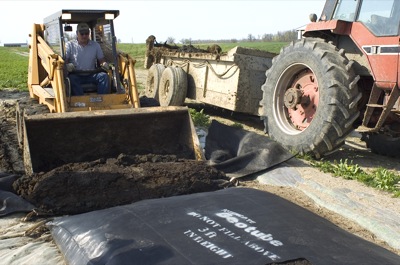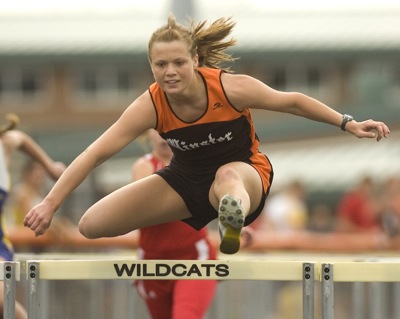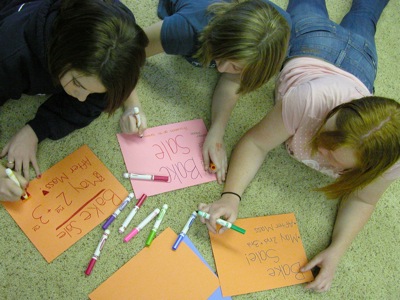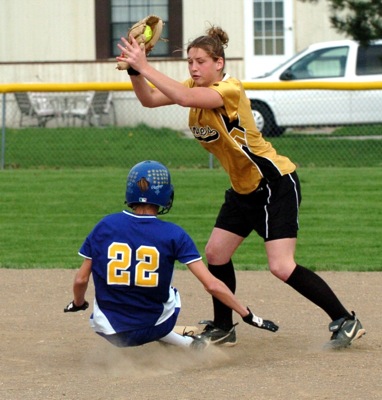Friday, April 25th, 2008
Geotubes opened at local hog farm
By Nancy Allen

Photo by Mark Pummell/The Daily Standard
Ivo Post scoops hog manure out of a Geotube at his farm Thursday near Maria Stein. The Grand Lake/Wabash Watershed Alliance is spearheading tests at two area farms to see if using Geotubes to separate manure from water is an economically feasible management tool for farmers. The liquid manure was pumped into three bags at Post's farm six months ago. Much of the water filtered out of the bag, leaving this moist, potting soil type mixture. Two Geotubes filled with dairy manure at another farm will be opened early next month.
Three Geotubes containing liquid hog manure were opened Thursday at a Maria Stein hog farm, but reports that will show whether the technology is economically feasible to use as a manure management tool won't be done until June.
Grand Lake/Wabash Watershed Alliance Coordinator Laura Walker reported the information Thursday during a meeting of the alliance's joint board of supervisors.
"It was interesting, it kind of looked like a moist potting soil texture," Walker said of the manure removed from the Geotubes. "Then it was spread on a field with a conventional manure spreader."
The alliance is helping sponsor Geotube trials at a hog farm owned by Ivo Post, 7176 state Route 119, and a dairy farm owned Randy Goettemoeller, 2482 Goettemoeller Road, both Maria Stein.
Six months ago three Geotubes were filled with hog manure at the Post farm and two were filled with cow manure at the Goettemoeller farm. The tubes at the dairy won't be opened until some time after May 5, Walker said.
A Geotube is a giant filter bags made of high strength polypropylene geotextile that can be filled with different types of liquid waste or dredge material. A polymer was added to the manure mixtures at both farms, which caused the solids and water to separate. The cleaner water has been running out of the bags over the winter in a process called "dewatering."
Geotubes have been traditionally used to remove impurities from wastewater and dredge material.
The initial reason local officials wanted to test the technology here is to help improve water quality in the local watershed and give farmers a tool toward that goal.
In Mercer County, which has the highest concentration of large livestock farms of any county in the state, the technology could be useful to farmers trying to find ways to manage their manure with the least amount of impact to the environment.
A Geotube can capture most of the phosphorous in manure and the resulting cleaner water can be used to irrigate crops, feed livestock or be discharged, said Brian Mastin, who works for Watersolve, the company that donated the polymers for the trials.
Removing much of the liquid from manure also makes it easier and more economical to handle and transport. Since it weighs much less and is in a dryer form, it can be easily scooped and spread.
The four areas of data that will be measured in the report that will be generated by Watersolve includes: the amount of solids captured in the Geotubes; the nutrient quality of the solids; the quality of the water filtering out of the Geotubes and what the water can be used for based on how clean or dirty it is; and the amount and concentration of nutrients in the solids, particularly phosphorous and nitrogen.
Many people are interested in the data, Mastin has said, including people from Poland, Hungary, Turkey, Mexico, Brazil, Peru, Argentina and Russia.
They are most interested in using the technology to reduce greenhouse gas emissions, components in the atmosphere believed to contribute to global warming. Some of the gases occur naturally in the atmosphere while others result from the burning of fossil fuels such as coal. Greenhouse gases also include water vapor, carbon dioxide, carbon monoxide, methane, nitrous oxide and ozone.
The primary greenhouse gas produced by livestock manure is methane, Mastin said.
When the local trials began six months ago, they were just one of two locations in the world to try Geotubes as a manure separating technology. The other is Rancho Chalma, Mexico.
Walker said other groups that will generate reports from the study include the nonprofit Lake Improvement Association (LIA) and the Mercer County Soil and Water Conservation District.
The Mercer SWCD received a $10,000 grant from the USDA's Natural Resources Conservation Service to buy the Geotubes. An additional $10,000 in matching funds was provided by the Mercer SWCD, Maria Stein Grain, Coldwater Young Farmers and the LIA.
The next watershed joint board meeting is 4 p.m. May 22 at the Mercer County Central Services Building in Celina.





